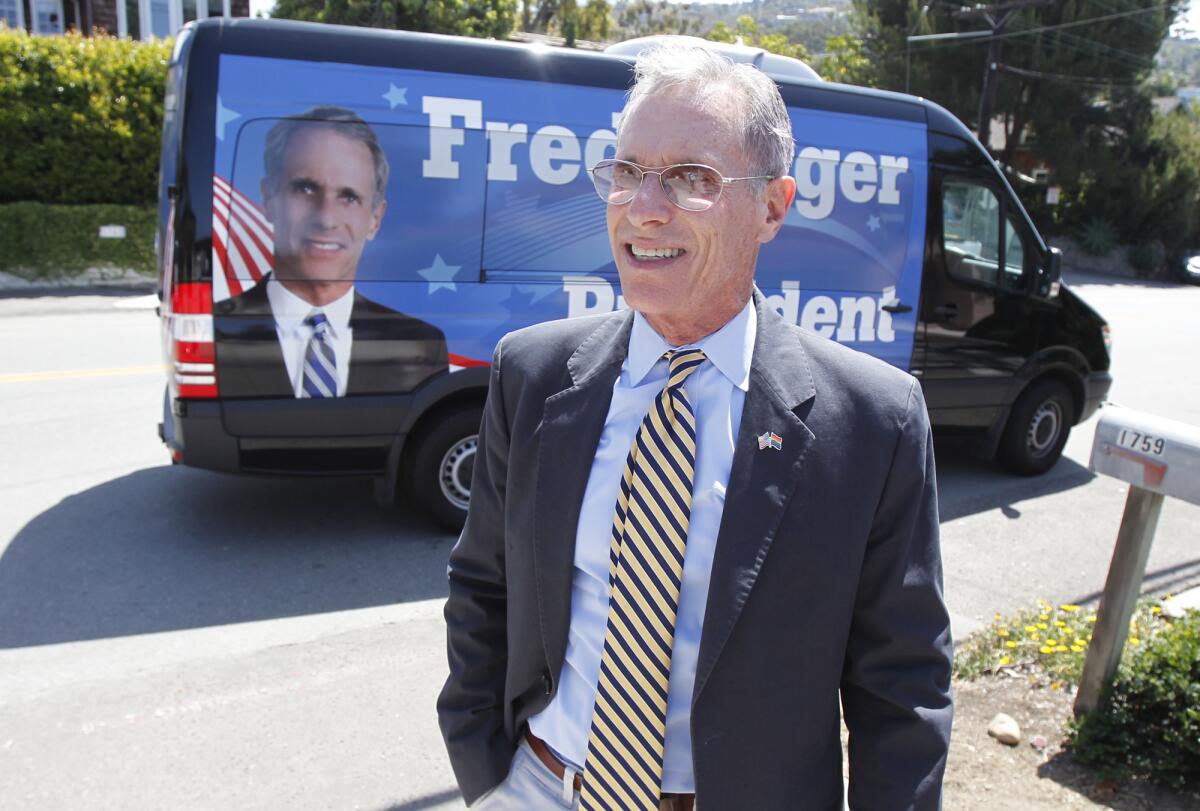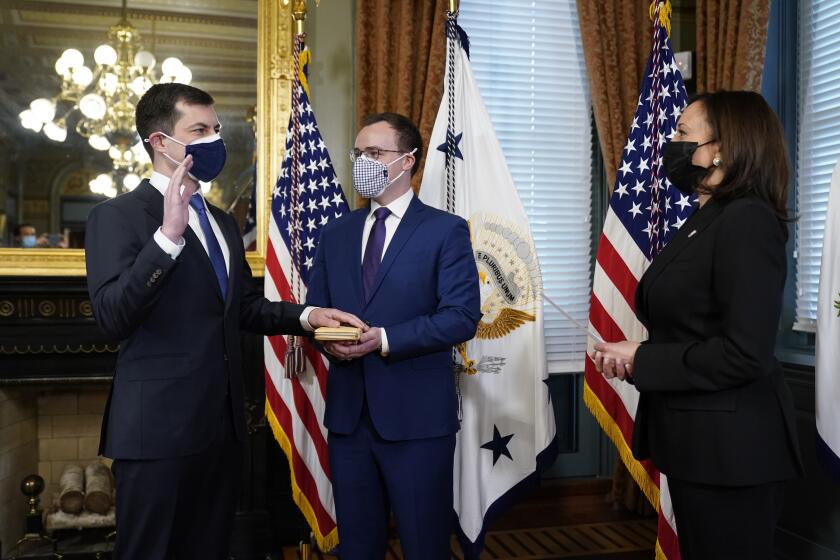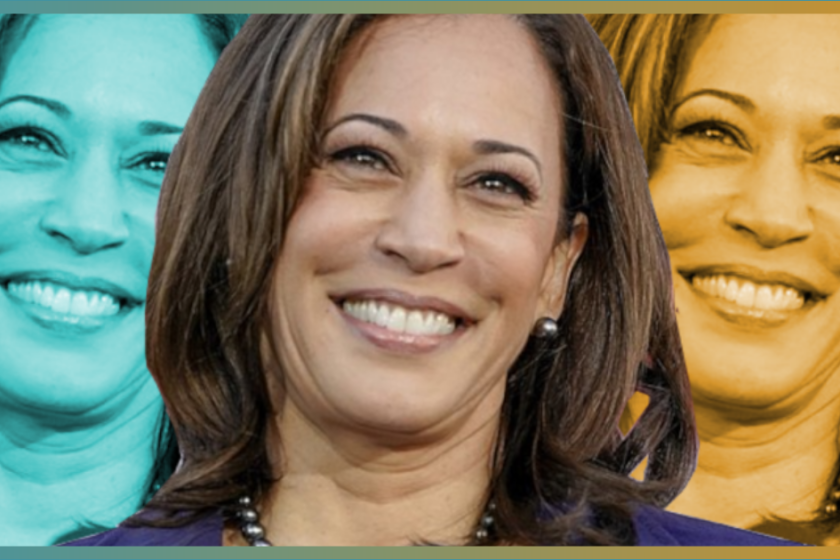Column: Sorry, Pete Buttigieg. It’s Fred Karger who belongs in the history books

- Share via
Fred Karger wants to set the record straight — no misunderstanding, no doubt, no confusion — once and for all.
“I have the distinction of being the first openly gay major party candidate to run for president of the United States,” he said, fresh from a walk about his neighborhood overlooking Laurel Canyon.
That’s a fact, even if it’s often forgotten or ignored.
In 2012, the former Republican consultant and corporate campaign strategist waged a long-shot bid for the GOP nomination. He had no illusions he would prevail, much less take up residency in the White House.
Karger’s main purpose was to participate in at least one campaign debate, to “send the message to gay younger people and older people and everyone in between that you can do anything you want in life and [not] feel bad about yourself and ... feel you have to live your life the way I did.”
He stayed closeted until he was 56. He’s now 71.
Allies call the purported rivalry between Kamala Harris and Pete Buttigieg silly talk. But eyes will be on them as they travel together.
Karger never made it onto the debate stage, his candidacy deemed unworthy by the television gatekeepers in charge of production. But he did run a bona fide campaign — swag, town halls, policy speeches, frequent visits to early-voting Iowa and New Hampshire — years before Pete Buttigieg became the supernova of the 2020 contest and a celebrated trailblazer.
Unlike Karger and his unavailing effort, Buttigieg performed well enough to vault himself into brief contention for the Democratic nomination, then the Biden Cabinet and now into the thick of speculation surrounding a second White House bid, in 2024, 2028 or beyond.
Buttigieg, the nation’s Transportation secretary, is also the one who stands between Karger and his rightful place in history.
“It started soon after I met him in February 2019” at an event in New York City, said the erstwhile candidate, who lives there part-time. Buttigieg’s campaign was improbably catching fire and along with the rave publicity came the first of countless references to the supposedly unprecedented nature of his surprisingly strong candidacy.

Before Pete Buttigieg, there was Fred Karger, the first openly gay candidate to run for president. Karger ran as a Republican in 2012, and while he didn’t get the nomination, he paved the way for candidates like Buttigieg. Here’s his story.
Not that Karger blames Buttigieg for the widespread misconception. He was impressed enough to sign on to his campaign as a fundraiser. He even voted for Buttigieg in California’s March 2020 primary, despite the fact the former South Bend, Ind., mayor had already quit the race and Biden was clearly on his way to winning the nomination.
Casting his ballot for Buttigieg was important enough that Karger, a lifelong Republican, changed his party registration to do so. “I told him I’d vote for him,” Karger said, “and I did.”
He appreciated the fact that Buttigieg, whenever introduced as the first openly gay candidate for president, made a point of clarifying the matter and giving Karger credit where credit was due. “He was always very gracious, as was his entire campaign staff,” Karger said via Zoom, a poster from the documentary “Fred” — a chronicle of his windmill-tilting campaign — hanging on the office wall behind him.
Still, the mistake kept popping up in campaign coverage, and continues to this day with distressing regularity. Karger created Google alerts to notify him of each instance and, by his count, has sent about 150 emails asking news organizations to correct the record.
Most, he said, willingly comply. For others, there is a letter drafted by Karger’s attorney, putting a bit of muscle behind the request for remediation.
If it seems like Kamala Harris has vanished, it’s because she’s doing her job of not upstaging President Biden.
Karger spent more than 30 years as a political advisor to several top Republicans — President Reagan and Vice President George H.W. Bush among them — and major corporations, including cigarette maker Philip Morris. He did well enough to retire at age 53 and complement his home in the Hollywood Hills with a place a block from the ocean in Laguna Beach.
In all those years, Karger said, he never asked for a correction, even when one was merited. People don’t like being told they’re wrong and so, he figured, why create bad will?
But, he said, his presidential candidacy was different. His motivation is straightforward: “I don’t want to be erased from history.”
“I put 2½ years, full-time, into that campaign,” Karger said, as well as $1 million of his own cash, which paid for travel to more than 30 states and Puerto Rico.
“There were thousands of people directly involved in that campaign,” he went on. “Large and small donors. Volunteers. It brought in a lot of people and I just don’t think it’s fair to them, or to me, and especially to LGBTQ history.”
Behind Karger was an old picket sign. It was a keepsake from his years on the front lines of the fight for same-sex marriage, a battle that helped change public opinion on the way to a landmark 2015 Supreme Court decision that made it legal throughout the land.
“I think it’s important that our history be recorded accurately,” Karger said, “and that I certainly be a part of that.”
More to Read
Get the latest from Mark Z. Barabak
Focusing on politics out West, from the Golden Gate to the U.S. Capitol.
You may occasionally receive promotional content from the Los Angeles Times.













